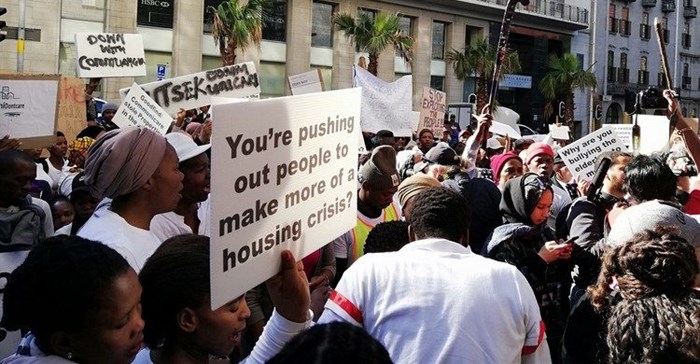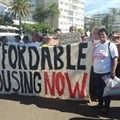About 400 people marched from Cape Town's Keizersgracht Street to the provincial Department of Human Settlements on Wednesday, 4 July. They handed over a memorandum demanding housing.

Hundreds of backyarders, informal settlement dwellers and social housing tenants (or former tenants) marched to the provincial Department of Human Settlement on Wednesday. Photo: Thembela Ntongana
The march was led by two organisations, the Foundation for Community Development and United Tenants association. At its forefront was Loyiso Nkohla, former leader of the Ses’khona movement and a current City of Cape Town support officer.
Most of the marchers were residents or former residents of social housing apartments in Cape Town run by non-profit company Communicare. Many were also backyarders and shack dwellers from Dunoon, Khayelitsha and Strand.
“Get the hell out our lives Communicare” shouted some of the marchers.
Transfer of ownership
The memorandum contained several demands related to relocation of informal settlements, creating serviced sites on land owned by the city, and installing of water and electricity. It also called for the transfer of ownership of Communicare apartments to tenants who have been renting for a period of five years or more.
Mpumelelo Mkunqwana has been a resident at a Communicare flat in Brooklyn for ten years. He said the company has been increasing rent at market related rates.
“Communicare is a property management company that is a non-profit organisation. They do not do any maintenance. The only thing they do is send statements and hand over people to lawyers if they do not pay rent. There are no meetings. There is no consultation.” He said the protesters wanted to ask Minister Bonginkosi Madikizela to intervene and “give people ownership over their rental flats or houses”.
“Communicare has evicted hundreds of people over the years, their processes are not meant for low income people. If you miss rent, they send you a letter from their lawyers and that letter alone is R100 which is added to [the bill of] someone already struggling to pay rent,” said Mkunqwana.
Communicare spokesperson Michelle Matthee said the company manages 339 social housing units. Rents range from R3,000 to R4,200 per month. The annual increase is from 5% to 19%.
Unit maintenance
She said that tenants were responsible for the maintenance inside their units, while Communicare maintained the outside. This is “in keeping with the Rental Housing Act”. She said in the past Communicare did assist tenants with internal maintenance. But the organisation has had to save costs. It has therefore told tenants that it is sticking to the agreement in the lease which says that the tenants have to take responsibility for the inside of their units.
She also said that when tenants do not pay rent, Communicare liaises with them to remedy the situation. “Our tenants can apply for temporary financial relief for three months if the problem is of a short term nature. However, if a tenant absolutely cannot pay their rental, we do have to serve notice.”
Xolelwa Halom of Ramaphosa Field in Philippi said they were demanding that there be no more evictions in their area. “We are tired of having our shacks demolished. We are here to say we want water, we want electricity,” said Halom.
Another resident from Soweto in Dunoon, Sinovuyo Dyokhwe said they were living in bad conditions. “We stay in a wet area. This government knows that … If we do not get answers, we will come back here.”
GroundUp editors 28 Jun 2018 Focus on informal settlements
The memorandum was accepted by the head of the Department of Human Settlement Thando Mguli. “All the backyarders, we have heard your cries and we as the organ of the state have done everything humanly possible to be able to respond as urgently as possible to the cries of the backyarders,” he said. “We are busy doing purchases of land where we will be providing houses for people who are living in backyards.”
He said the department is focusing on provision of services to informal settlements.
With regard to Communicare, he said the department will meet with the Social Housing Regulatory Authority to look at the issues raised in the memorandum.
Article originally published on GroundUp.





























